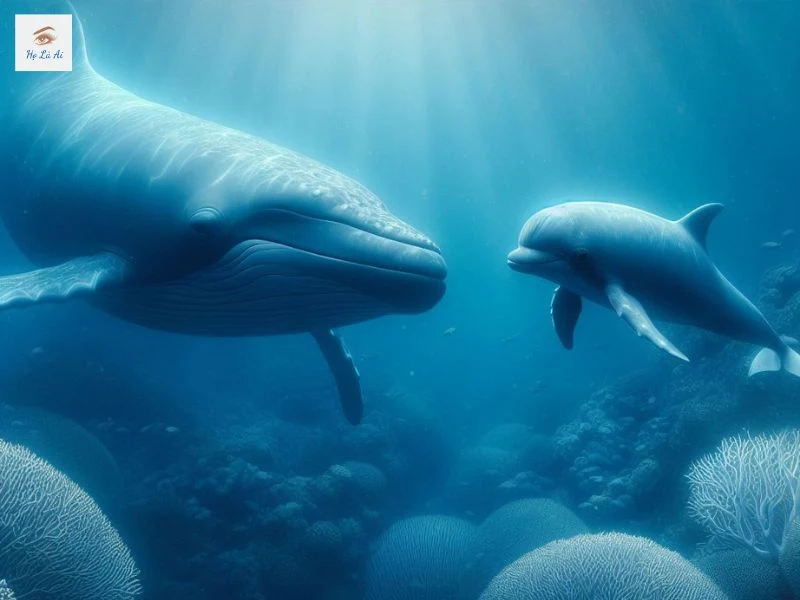In the vast and mysterious world of the ocean, two powerful creatures reign supreme - porpoise vs whale. These cetaceans possess unique abilities, impressive sizes, and distinct strengths, making them formidable contenders in a hypothetical battle. But who would win in a fight? In this article, we will delve into the capabilities of porpoises and whales, compare their strengths and weaknesses, and ultimately determine who would win in a face-off between these two marine giants.
Porpoise's Abilities, Size, and Strengths
Porpoises, belonging to the Phocoenidae family, are known for their exceptional agility, speed, and intelligence. Their sleek, torpedo-shaped bodies allow them to glide through the water with ease and precision. With their streamlined bodies, porpoises can reach speeds of up to 20 miles per hour, making them swift and maneuverable hunters.
One of the most remarkable abilities of porpoises is their echolocation. They emit high-frequency clicks that bounce off objects in their surroundings, allowing them to create a sonar-like image of their environment. This ability enables them to locate prey and navigate in murky waters or complete darkness, giving them an advantage over other marine animals.
In terms of size, porpoises are relatively smaller compared to whales, with an average length of less than 9 feet. However, their smaller size does not hinder their strength and agility. In fact, it gives them an edge in maneuverability, allowing them to swiftly change directions and outmaneuver larger predators.
Porpoise Species and Their Unique Traits
There are seven recognized species of porpoises, each with its own unique characteristics and adaptations. Let's take a closer look at some of these species and their notable traits:
- Harbor Porpoise - This is the most common species of porpoise, found in coastal areas or river estuaries of the Northern Hemisphere. They have a stocky body and a small head, making them well-suited for navigating through rocky areas.
- Dall's Porpoise - This species is known for its striking black and white coloration, similar to that of an orca. They are also one of the fastest cetaceans, reaching speeds of up to 34 miles per hour.
- Vaquita - The smallest and most endangered species of porpoise, the vaquita is found only in the Gulf of California. They have dark rings around their eyes, giving them a "panda-like" appearance.
- Spectacled Porpoise - This elusive species is rarely seen in the wild and is named after the distinctive white patches around its eyes, resembling spectacles. They are known for their deep dives, reaching depths of up to 1,000 feet.
Whale's Abilities, Size, and Strengths
Whales are indeed the largest animals on Earth, with some species, such as the blue whale, reaching up to 100 feet in length and weighing over 200 tons. Their immense size, powerful tails, and either baleen or teeth make them formidable creatures in the ocean.
One of the most impressive abilities of whales is their communication skills. They use a variety of sounds, including songs, clicks, and whistles, to communicate with other whales over long distances. Some species, such as humpback whales, are even known for their complex and beautiful songs.
In terms of size, whales vary greatly depending on the species. The blue whale, the largest species, can reach lengths of up to 100 feet. The smallest, the dwarf sperm whale, grows to only 8 feet.
Whale Species and Their Unique Traits
Let's take a closer look at some of these species and their notable traits:
- Blue Whale - As mentioned earlier, the blue whale is the largest animal on Earth, growing up to 100 feet in length and weighing over 200 tons. They have a heart the size of a small car and can consume up to 8,000 pounds of krill in a single day.
- Humpback Whale - Known for their acrobatic displays and beautiful songs, humpback whales are one of the most beloved species of whales. They also have the longest pectoral fins of any cetacean, measuring up to 15 feet in length.
- Beluga Whale - These white whales are known for their distinctive melon-shaped head and vocalizations that sound like chirps, whistles, and squeaks. They are also highly social animals, often found in groups called "pods", 11–15 feet long.
- Sperm Whale - The largest toothed predator on Earth, sperm whales can grow up to 60 feet in length. They have the ability to dive to depths of up to 3,000 feet in search of food.
Comparison of Porpoise and Whale
Now that we have explored the abilities, sizes, and strengths of porpoises and whales, let's compare them side by side to determine who would win in a hypothetical battle.
| Criteria | Porpoise | Whale |
|---|---|---|
| Size | Smaller (6-8 feet) | Larger (up to 100 feet) |
| Speed | Up to 30 miles per hour | Varies depending on species |
| Echolocation | Excellent | Varies depending on species |
| Communication | Limited | Complex and diverse |
| Strength | Agile and maneuverable | Powerful and strong |
From this comparison, it is clear that both porpoises and whales possess unique abilities and strengths. While porpoises may have an advantage in agility and echolocation, whales have the upper hand in size and strength.
Porpoise vs Whale who would win?
Let's talk about the question of who would win in a hypothetical match-up between a porpoise and a whale. It's important to remember that these animals are not naturally aggressive towards each other and they usually live peacefully in the ocean. In fact, some species of porpoises and whales can even have hybrid offspring.
If we were to imagine a situation where a harbor porpoise was up against a dwarf sperm whale, the porpoise's agility and echolocation might give it an advantage. But if we were to compare a killer whale (which is actually a type of dolphin) to a blue whale, the killer whale's intelligence and hunting skills could be more advantageous.
As for the question of who is stronger, it's not easy to determine. Both porpoises and whales have unique strengths and abilities that make them well-suited for their environments. If we consider overall strength and power, whales might have the upper hand because of their immense size and powerful tails. But when it comes to agility and maneuverability, porpoises could have the advantage.
Remember, these are just hypothetical scenarios. In the real world, these wonderful creatures live in harmony with each other in the vast ocean. They each have their own special roles in the ecosystem and contribute to the balance of life in the sea. Isn't that amazing?
Fictional Battle: Porpoise vs Whale
To add a bit of fun to this article, let's imagine a fictional battle between a porpoise and a whale. In this scenario, we will pit a harbor porpoise against a humpback whale.
The battle takes place in the open ocean, with no interference from other animals or humans. The porpoise, using its echolocation, spots the humpback whale in the distance and decides to attack. The whale, sensing the porpoise's presence, prepares for the incoming attack.
The porpoise uses its agility and speed to dart around the whale, trying to confuse and tire it out. However, the humpback whale's powerful tail and pectoral fins prove to be effective weapons, as it swipes at the porpoise with great force.
Despite the porpoise's best efforts, the humpback whale eventually lands a powerful blow, knocking the porpoise unconscious. The whale then swims away, leaving the porpoise floating helplessly in the water.
While this may seem like a sad ending for the porpoise, it is important to remember that this is just a fictional scenario. In reality, both animals would most likely avoid confrontation and coexist peacefully in their natural habitats.
Conclusion
In conclusion, the question of who would win in a battle between a porpoise vs whale cannot be definitively answered. Both animals possess unique abilities, strengths, and sizes that make them formidable creatures in the ocean. While whales may have the advantage in size and strength, porpoises are swift, agile, and highly intelligent.
Ultimately, instead of pitting these animals against each other, we should appreciate and admire their individual strengths and abilities. After all, both porpoises and whales are vital parts of our marine ecosystem and deserve our respect and protection.







